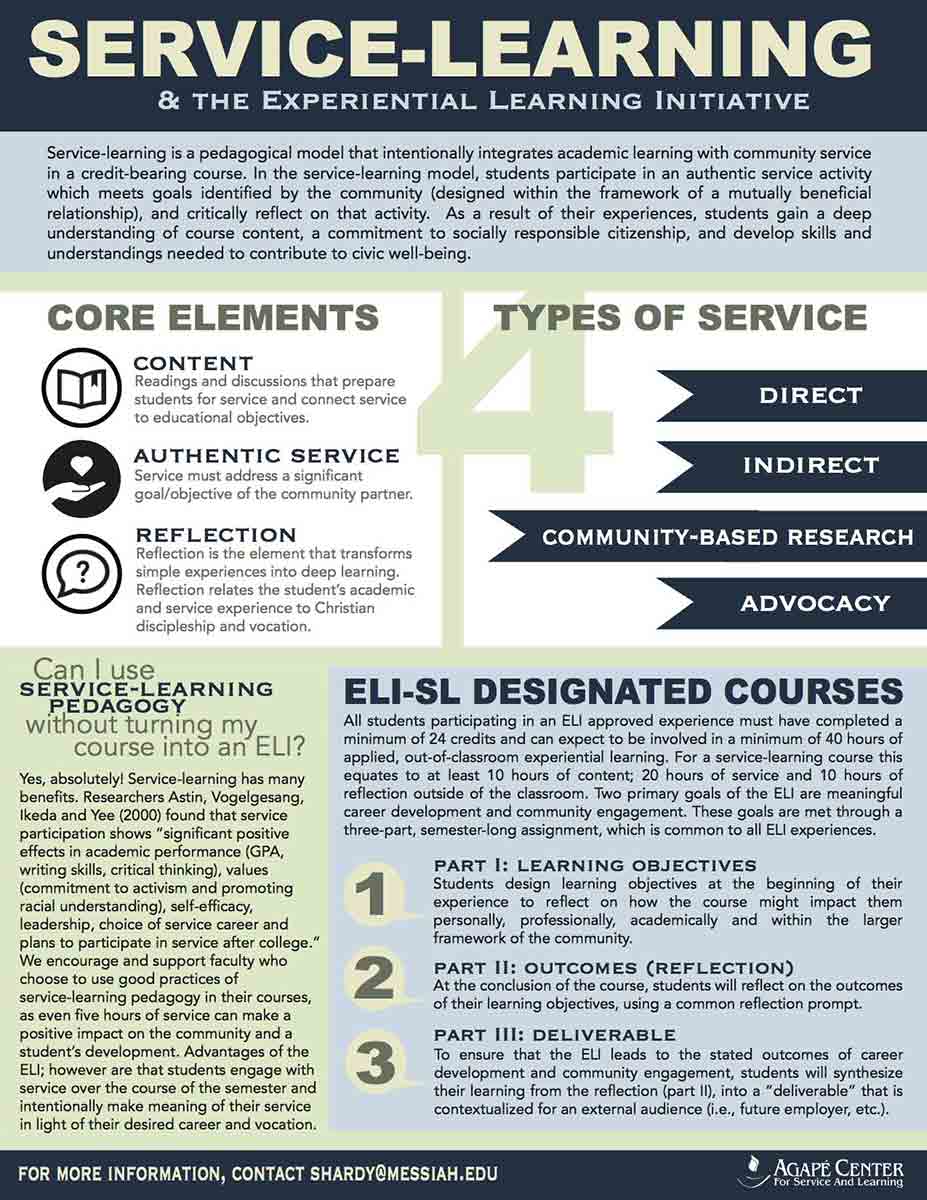Curricular Service-Learning at Messiah
Curricular service-learning is a pedagogical model which intentionally integrates academic learning with community service in a credit-bearing academic course. Students participate in an authentic service activity, which meets needs identified by the community (designed within the framework of a mutually beneficial relationship) and then they critically reflect on that activity. Thus, students gain a deep understanding of course content, a commitment to socially responsible citizenship, and develop skills and understanding needed to contribute to civic well-being.
- Faculty provide students with greater understanding of their subject
- Faculty experience personal satisfaction in knowing that students are making a difference in their communities
- Faculty are offered a renewed challenge in understanding and applying their subject matter
- Provides academic credentials in applying a unique, respected, and valued pedagogy
- Provides research, grant, and publication opportunities
- Positive impact on students’ academic learning
- Improves students’ ability to apply what they have learned in “the real world”
- Positive impact on academic outcomes such as demonstrated complexity of understanding, problem analysis, problem-solving, critical thinking, and cognitive development
- Improved ability to understand complexity and ambiguity
- Greater sense of personal efficacy, personal identity, spiritual growth, and moral development
- Greater interpersonal development, particularly the ability to work well with others, and build leadership and communication skills
- Reduced stereotypes and greater inter-cultural understanding
- Improved social responsibility and citizenship skills
- Greater involvement in community service after graduation
- Connections with professionals and community members for learning and career opportunities
- Greater academic learning, leadership skills, and personal efficacy can lead to greater opportunity
- Satisfaction with student participation
- Valuable human resources needed to achieve community goals
- New energy, enthusiasm and perspectives applied to community work
- Enhanced community-university relations
Experiential Learning Initiative (ELI)
While some faculty may choose to pursue a one-time, project-based service-learning experience, faculty who wish to integrate service as a core experience within their course are encouraged to submit a proposal for ELI-SL approval.
Service-Learning courses which have a minimum of 10 hours of content, 20 hours of service and 10 hours of reflection outside of the classroom, are ideal for becoming an ELI-approved experience.
- Content refers to the strategies and resources that are employed to prepare students for their service-learning and community engagement. Content should aim to help students apply knowledge as they put theory into practice within a particular service-learning context.
- Service-Learning is a type of community engagement that seeks collaboration between institutions of higher education and their larger communities (local, regional/state, national, global, etc.) for the mutually beneficial exchange of knowledge and resources in a context of partnership and reciprocity. Service may be direct, indirect, research-based or advocacy.
- Reflection engages students in activities that help them make meaning of their service by themselves, with their peers and with community partners before, during and after their experiences. Particular attention should be given to helping students transfer their learning from the classroom context to the community context and back again as they put theory into practice.
Any faculty/department desiring to offer a service-learning course designated as fulfilling a student’s Experiential Learning (ELI) requirement must complete the ELI Proposal Form. Course proposals are due by October 15th for spring and March 15th for fall. All students who enroll and successfully fulfill the requirements of an ELI-SL designated course will fulfill the ELI requirement.
Types of Service
Service may encompass a wide range of activities; however, service-learning courses at Messiah primarily fall within one of four types of service-learning experiences:
Students directly engage community members through a Community Partner (i.e., after school tutor; volunteer at homeless shelter, etc.)
Students build capacity for a Community Partner (i.e., develop a marketing campaign for a non-profit, etc.)
Students collect information for public welfare or interest. The research must be done with a direct connection to a specific Community Partner who is driving the research agenda (i.e., research and test water to assist with restoration efforts, etc.)
Students use their voices, writing ability and other talents to work with a Community Partner to raise collective awareness about a social issue (i.e., develop a documentary about human trafficking, etc.)
